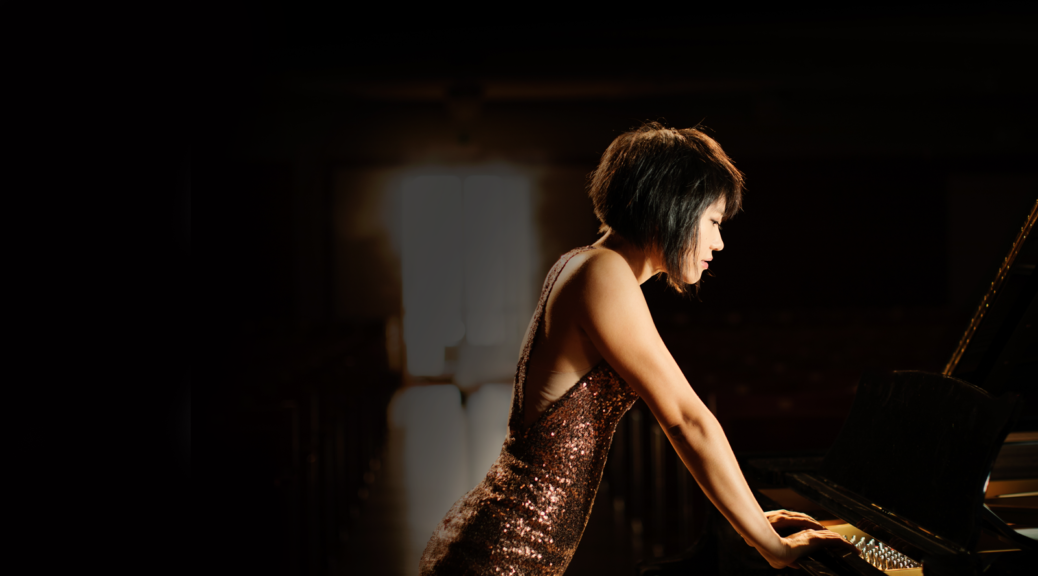
WHAT OPUS WAS SHE PLAYING, ANYWAY?
When appearing at the piano, can anyone surpass the dazzling attire of the stellar Yuja Wang?
Though a superstar in the classics, she and her attire comprised all the queries I got from men and women before the March 1 concert: What was her outfit this time around? Even an usher at Davies ventured to the subject with intrigue, “Well, we’ll soon see what she’s wearing, won’t we?”
She dazzled, showing up in a gold-sequined bareback formal somewhere between haute couture and show-biz glitz. When sitting on the bench revealed her legs as well, she showed more of herself than in many a bathing suit. Somehow despite the golden three-inch heels, she still could work the pedals.
Management could hardly quibble with the end result, as her concerto appearance had sold out the house, apparently for the first time in the S.F. Symphony masterworks subscription series since the start of the pandemic three years ago. That astonishing box-office jingle-jangle could probably drown out the entire percussion section on stage. Patrons resenting Yuja’s curious visual emphasis would be drowned out.
Any condemnation of the showy high fashion falls prey to Wang’s prowess as an astounding keyboard artist. Despite her slender frame and delicate arms, she powers her way through what many consider the most technically difficult piano concerto of all, the so-called Rach3 (more formally, the Rachmaninoff Piano Concerto No. 3). Those machine-gun octaves and the blurring fingers executing runs come out with vibrant impact and polish. She need not watch the conductor, it’s vice versa, with Esa-Pekka Salonen watching her hands and following adroitly, turning his frame away from the music stand to remain vigilant and totally synched. Her elfin appearance suggests that this Beijing-born artist and recording dynamo is only half her true age of 36.
And just when you are convinced that the knotty pages of the congenial score are past, the finale of the three-quarter-hour work brings on some of the choppiest challenges of all for the soloist, as if on a sailboat at sea entering a violent thundersquall.
They brought down the house. “They” were either the orchestra, the concerto‘s punishing challenges, Yuja and the conductor, the clothes—–or a compound of some of these elements.
Shouts of joy and a standing ovation from the enraptured audience. She returned after all the bows to render two solo encores: Schubert’s “Gretchen at the Spinning Wheel” (a lied transposed and arranged by Liszt, now full of fireworks display) and Gluck’s operatic “Dance of the Blessed Spirits” from the opera “Orfeo ed Euridice.”
In case any one remembered, the Yuja show was preceded by two orchestral works: Salonen’s mystical “Nyx” (2010) and Gabriella Smith’s somewhat shorter “Tumblebird Contrails” (2014), with both composers in attendance. The two works were dense, even impenetrable instrumental overlays with few emerging themes. Yet not alike: Smith was a tone-painter inspired by the Point Reyes National Seashore, while Salonen was portraying an amorphous Greek goddess, Nyx, who was identified as something of a membrane, with further allusion musically to Richard Strauss’ tone poems. Basking in anonymity was clarinet principal Carey Bell with his adroit extended solos. The orchestra appeared thorough and expressive. You could ace a music grad-school thesis project by comparing and contrasting these two heavy, heavy opuses.
MUSIC NOTES—The sold-out house was even further at sea than Pt. Reyes in these, since the printed programs were buried somewhere in the High Sierra snows, never arriving. Patrons got a single title page instead (and Carey Bell got anonymity, as noted above)….The rare Wednesday-night performance was in part to accommodate music-marathoner Wang’s heavy schedule, playing only three times locally through Friday.
San Francisco Symphony led by Music Director Salonen in works by him, G. Smith, Rachmaninoff, with piano soloist Yuja Wang, March 1-2. Davies Symphony Hall, S.F. For info: (415) 864-6600, or online, www.sfsymphony.org.